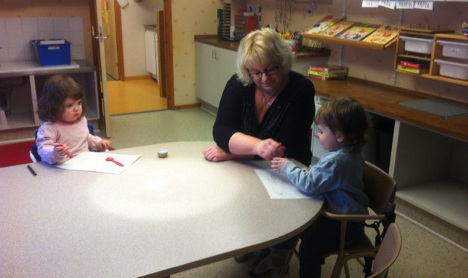'With Swedish childcare everyone's a winner'

Our northern Sweden correspondent, Paul Connolly, loves the Swedish "dagis" system - luckily so do his twin daughters, who have just started daycare in the Nordic nation.
As a father of twins I've garnered a good few new friends who also have been 'blessed' with two toddling whirlwinds. The one thing all my Swedish-residing twin parents give thanks for is the Swedish daycare system, "dagis".
Funnily enough, daycare is also the one aspect of twin parenting that drives my American and British friends barmy. Daycare is essential for parents of twins, if they are to have any kind of life outside nappies, tantrums and feeding. Two toddlers of the same age aren't double the amount of work as one, they're at least treble. They egg each other on, try to impress one another with naughty antics, love a good food fight and compete with one another to present us with the most interestingly-filled nappy.
So, when I told a UK-based twin parent of our plans to send our girls to daycare when they reached 18 months, she was inspired to look into similar provisions for her double troubles. She really wanted to get back to work, part-time. Three days later she sent me an e-mail that made me almost white in the face. For the same number of hours that our two spent tormenting local children in Sweden, she would have to pay 100 times more each month in the UK. No, that's not a typo. There really should be two noughts there. And, no, she doesn't live in expensive southern England; she lives near Newcastle, up north. So, she simply cannot afford to send her boys to nursery and is forced to forget about her career for the time being.
Sweden is at the vanguard of social progressivism and nowhere is this more obvious than with daycare. Our daycare's curriculum features a section on values. This section emphasises the importance of ensuring that each child develops openness, respect, solidarity, responsiblity and empathy. Another section underlines that those with a mother tongue other than Swedish should be able to develop their cultural identity and their ability to communicate in both Swedish and their mother tongue. These are all valuable, inclusive values - I feel comfortable that this system is helping to nurture my girls.

Paul Connolly's twin girls are learning Swedish at dagis. Photo: Private
I also feel very comfortable with the standards of the teachers. Like the hospital staff we've encountered up here in the north who were natural caregivers, our girls' teachers were simply born to look after toddlers. Their patience is endless, their words are tender and their guidance faultless. After just a week of exposure to these three women, our girls were kissing them goodbye. After 21 months, I barely qualify for a kiss from my two beautiful monsters.
Feedback from friends in other countries has been, at best, spotty. There are tales of children being left alone for long stretches, full nappies being ignored, inadequate food being provided. And that's paying an average of around £200 (2580 kronor) per week in the UK and $275 (2300 kronor)in the U.S.
It's possible we've just been lucky - maybe our förskola is remarkable. Or perhaps the Swedes have just got their generous daycare provisions bang on. Even when you take Swedish tax and UK childcare vouchers into consideration, a Swedish couple paying the maximum childcare rate of 1,260 kronor per child for two children, need to earn around 25 percent less than an English couple to enjoy the same level of childcare and a comparable standard of living.
But it's not just about fairness and quality of life. Economically, cheap or free childcare makes perfect sense. Recent research has indicated that the increased tax revenues that would result from providing cheap, Swedish-style care for all UK pre-school children would outstrip the initial cost.
Most important of all, though, is it's good for our girls and their future. In small rural communities like ours, friendships are made very early in life and attending a dagis at their age should stand them in good stead if we do decide to stay in northern Sweden for the long-term. In the meantime, their parents get to have a cup of tea and read the newspaper in peace...
Comments
See Also
As a father of twins I've garnered a good few new friends who also have been 'blessed' with two toddling whirlwinds. The one thing all my Swedish-residing twin parents give thanks for is the Swedish daycare system, "dagis".
Funnily enough, daycare is also the one aspect of twin parenting that drives my American and British friends barmy. Daycare is essential for parents of twins, if they are to have any kind of life outside nappies, tantrums and feeding. Two toddlers of the same age aren't double the amount of work as one, they're at least treble. They egg each other on, try to impress one another with naughty antics, love a good food fight and compete with one another to present us with the most interestingly-filled nappy.
So, when I told a UK-based twin parent of our plans to send our girls to daycare when they reached 18 months, she was inspired to look into similar provisions for her double troubles. She really wanted to get back to work, part-time. Three days later she sent me an e-mail that made me almost white in the face. For the same number of hours that our two spent tormenting local children in Sweden, she would have to pay 100 times more each month in the UK. No, that's not a typo. There really should be two noughts there. And, no, she doesn't live in expensive southern England; she lives near Newcastle, up north. So, she simply cannot afford to send her boys to nursery and is forced to forget about her career for the time being.
Sweden is at the vanguard of social progressivism and nowhere is this more obvious than with daycare. Our daycare's curriculum features a section on values. This section emphasises the importance of ensuring that each child develops openness, respect, solidarity, responsiblity and empathy. Another section underlines that those with a mother tongue other than Swedish should be able to develop their cultural identity and their ability to communicate in both Swedish and their mother tongue. These are all valuable, inclusive values - I feel comfortable that this system is helping to nurture my girls.

Paul Connolly's twin girls are learning Swedish at dagis. Photo: Private
I also feel very comfortable with the standards of the teachers. Like the hospital staff we've encountered up here in the north who were natural caregivers, our girls' teachers were simply born to look after toddlers. Their patience is endless, their words are tender and their guidance faultless. After just a week of exposure to these three women, our girls were kissing them goodbye. After 21 months, I barely qualify for a kiss from my two beautiful monsters.
Feedback from friends in other countries has been, at best, spotty. There are tales of children being left alone for long stretches, full nappies being ignored, inadequate food being provided. And that's paying an average of around £200 (2580 kronor) per week in the UK and $275 (2300 kronor)in the U.S.
It's possible we've just been lucky - maybe our förskola is remarkable. Or perhaps the Swedes have just got their generous daycare provisions bang on. Even when you take Swedish tax and UK childcare vouchers into consideration, a Swedish couple paying the maximum childcare rate of 1,260 kronor per child for two children, need to earn around 25 percent less than an English couple to enjoy the same level of childcare and a comparable standard of living.
But it's not just about fairness and quality of life. Economically, cheap or free childcare makes perfect sense. Recent research has indicated that the increased tax revenues that would result from providing cheap, Swedish-style care for all UK pre-school children would outstrip the initial cost.
Most important of all, though, is it's good for our girls and their future. In small rural communities like ours, friendships are made very early in life and attending a dagis at their age should stand them in good stead if we do decide to stay in northern Sweden for the long-term. In the meantime, their parents get to have a cup of tea and read the newspaper in peace...
Join the conversation in our comments section below. Share your own views and experience and if you have a question or suggestion for our journalists then email us at [email protected].
Please keep comments civil, constructive and on topic – and make sure to read our terms of use before getting involved.
Please log in here to leave a comment.